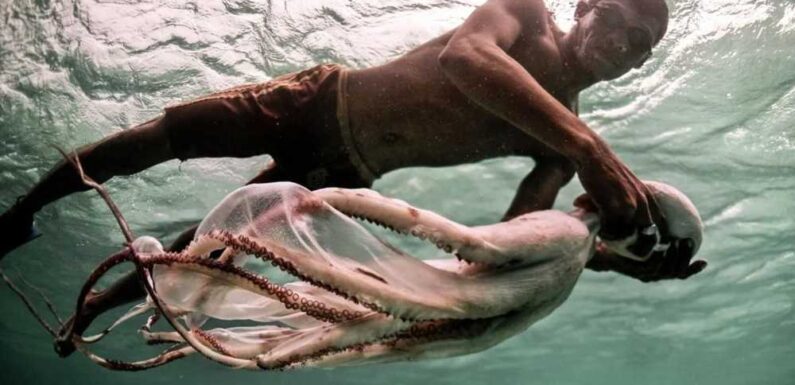
AN incredible tribe of fish-people can hold their breath under water for ten minutes to spear dinner thanks to genetic mutation known as "sea nomad gene".
The Bajau people of South-East Asia have developed bigger spleens to store more oxygen in their blood for free-diving.
The water tribe lives in the crystal blue seas across the coasts of the southern Philippines, Indonesia and Malaysia, but never settles on land.
They are known for their nomadic lifestyle, being dubbed as sea gypsies.
These fishermen look like real-life Aquaman thanks to their extraordinary diving abilities.
Bajau people have larger spleens which allow them to stay underwater for up to ten minutes at depths of 200 feet.
read more world news

Brit boy, 5, dies on first holiday abroad after falling into pool in Egypt

Brit family's shock as daughter arrested over 'terror hit' on politician
Located close to the stomach, the fist-sized spleen acts as a biological "scuba tank", storing extra oxygen in the blood.
Dr Ilardo from the University of Copenhaden told BBC: "The spleen is a reservoir for oxygenated red blood cells, so when it contracts, it gives you an oxygen boost."
Dr Ilardo and her colleagues found that both divers and non-divers from the community have similar sized spleens.
This could mean that the enlargement isn't simple a consequence of diving, but a product of evolution.
Most read in The Sun

Grace Dent QUITS I’m A Celeb ‘on medical grounds’ as fans spot moment she broke

I’m A Celeb in ‘sexism’ row as Nella Rose slammed over ‘toxic’ views about men

Strictly fans left baffled as ‘editing blunder’ is exposed during results show

Girl, 9, who vanished while walking a puppy has been ‘found safe and well’
The Bajau might have developed a bigger spleen size to sustain their long, frequent dives that they practised for thousands of years.
"They dive repeatedly for eight hours a day, spending about 60 per cent of their time underwater," said Dr Ilardo.
These dives are performed only with a wooden mask or goggles, and a weight belt.
The sea nomads use their remarkable skills to spear dinner, feeding primarily on sea creatures like fish, lobsters and sea cucumbers.
The latter is also used as a medicine and even an aphrodisiac.
The tribe is self-sufficient, relying on their maritime hunting techniques for subsistence.
Any essentials they can't find in the ocean, they get by trading surplus fish with islanders.
Instead of traditional houses, Bajau choose to live in wooden huts on stilts and handmade boats.
And the children of the tribe learn how to catch fish with the netinstead of learning maths or history from schools.
The sea nomads rely on the ocean so much that instead of using clocks, they observe the movement of the tides to tell the time.
The children reportedly spend so much time in the ocean that their eyes adjusted to see clearly underwater.
Just like those who live on land struggle with sea sickness, Bajau experience "land sickness" when they leave the water.
But many of the tribe are now forced to settle on coast permanently.
The world's only community of sea nomads is slowly disappearing.
As of 2023, only about 100 to 200 Bajau still lead their unique Ocean-bound lifestyle.
For sea nomads, borders didn't exist and were defined by how far their boats could reach.
Until Malaysia, the Philippines and Indonesia created maritime borders in the Sulu sea in 1885.
But it was the Malaysian Immigration Act of 1959/1963 that left Bajau in a precarious situation.
The legislation failed to distinguish between asylum seekers, refugees, irregular migrants and undocumented or stateless individuals.
Ever since then, the tribe had to battle the bureaucratic processes – neither stateless nor citizen.
The national park's restrictions on cutting trees coupled with the scarcity of funds for repairs forced Bajau to abandon their boats.
Once self-sufficient, the water tribe finds itself in poverty when they set foot ashore.
Deprived of government privileges, Bajau children can't attend public schools.
And without fishing, adults are struggling to find formal employment.
Source: Read Full Article









